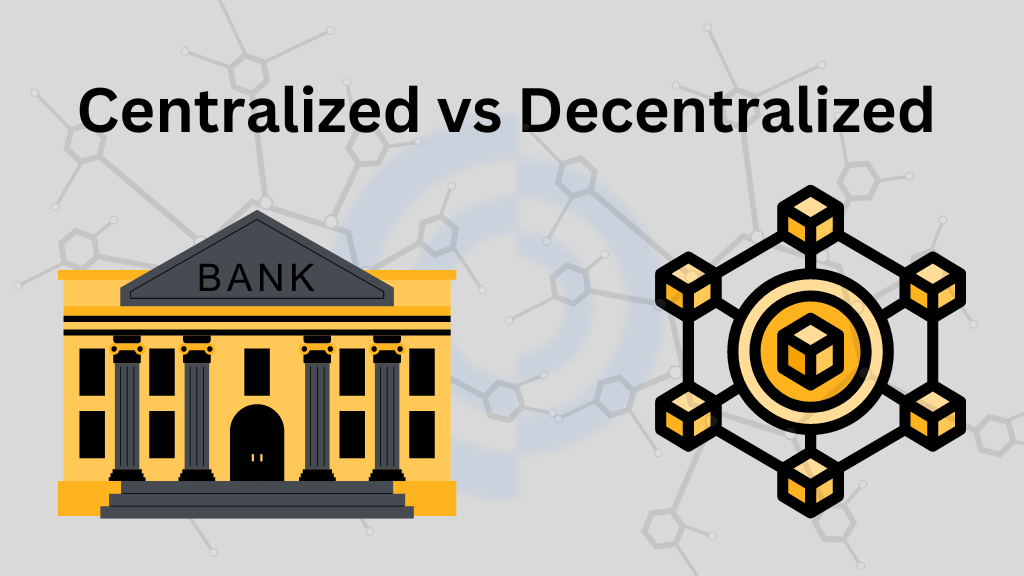Centralized vs. Decentralized Exchanges: A Comprehensive Comparison of CEX and DEX Models
 flynn rider
flynn rider
A centralized exchange (CEX) and a decentralized exchange (DEX) are two types of cryptocurrency exchanges with distinct operating models. Both facilitate the buying, selling, and trading of digital assets, but they differ in control, security, and user experience.
Centralized Exchange (CEX)
A centralized exchange operates similarly to traditional financial institutions, where a central entity (the exchange) acts as an intermediary between buyers and sellers.
Key Features:
Third-Party Control: The exchange holds users' funds and private keys, acting as a trusted intermediary.
User-Friendly Interface: CEX platforms typically offer a smoother, more intuitive user experience with easy-to-use interfaces.
Liquidity: Centralized exchanges usually have higher trading volumes and liquidity, which helps facilitate faster and larger transactions.
Speed: Transactions on a CEX are typically faster because the exchange handles all operations internally.
KYC/AML Requirements: Most centralized exchanges enforce Know Your Customer (KYC) and Anti-Money Laundering (AML) protocols, requiring users to verify their identity.
Security Risks: Because user funds are stored on the exchange, they can be vulnerable to hacks, and users have to trust the exchange with their assets.
Pros:
Ease of Use: More suitable for beginners due to simplified interfaces and support.
High Liquidity: Easier to execute large trades with minimal price slippage.
Customer Support: Offers dedicated support to resolve user issues.
Cons:
Custody of Funds: Users don’t control their private keys, meaning they don’t have full ownership of their funds.
Hacking Risks: Centralized exchanges are prime targets for cyber-attacks, and if the exchange gets hacked, users could lose their funds.
Regulation: Subject to government regulations, which could affect the trading environment or user privacy.
Examples:
Binance
Coinbase
Kraken
Huobi
Decentralized Exchange (DEX)
A decentralized exchange operates without a central authority, allowing users to trade cryptocurrencies directly with each other, peer-to-peer (P2P). DEX platforms use smart contracts to facilitate trades automatically on the blockchain.
Key Features:
No Intermediary: Users retain full control over their funds and private keys, trading directly with others via smart contracts.
Increased Privacy: DEXs typically don’t require KYC or identity verification, offering more privacy to users.
Smart Contracts: Transactions are executed automatically through smart contracts, which are self-executing code stored on the blockchain.
Lower Security Risks: Since users control their funds, there is no centralized honeypot for hackers to attack.
Liquidity Challenges: DEXs often suffer from lower liquidity compared to CEXs, which may lead to higher slippage and slower trade execution.
Pros:
Full Control of Assets: Users maintain custody of their private keys and assets.
Privacy: No KYC or identity verification is typically required.
Security: Lower risk of hacks, as funds are not stored on a central platform.
Global Accessibility: Anyone with a crypto wallet can access a DEX without geographical restrictions.
Cons:
Lower Liquidity: Some DEXs struggle with liquidity, making large trades harder to execute without price impacts.
Complex User Interface: Often more complicated to use, especially for beginners.
No Customer Support: Since there’s no central authority, users must handle their own issues, like lost private keys.
Examples:
Uniswap
PancakeSwap
SushiSwap
Curve Finance
Conclusion
CEXs offer convenience, higher liquidity, and easier user experiences but come with trade-offs like centralized control and security risks. DEXs provide greater privacy, security, and control over assets but may have lower liquidity and a steeper learning curve. The choice between a CEX and a DEX depends on your needs, trading preferences, and how much control you want over your assets.
Subscribe to my newsletter
Read articles from flynn rider directly inside your inbox. Subscribe to the newsletter, and don't miss out.
Written by

flynn rider
flynn rider
I am a Blockchain enthusiast that enjoys talking about cryptocurrencies and their growth. By doing that, I hope to inspire aspiring entrepreneurs to come up with company concepts.